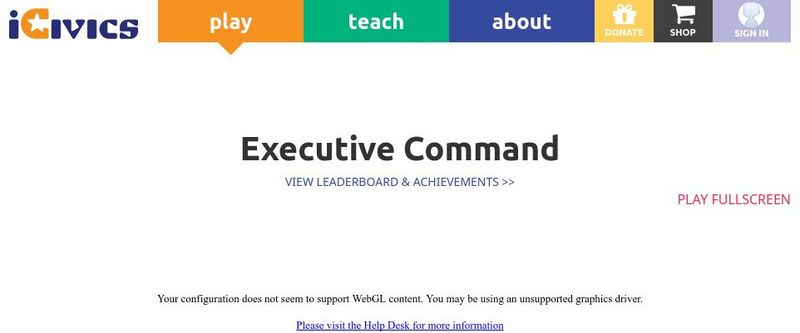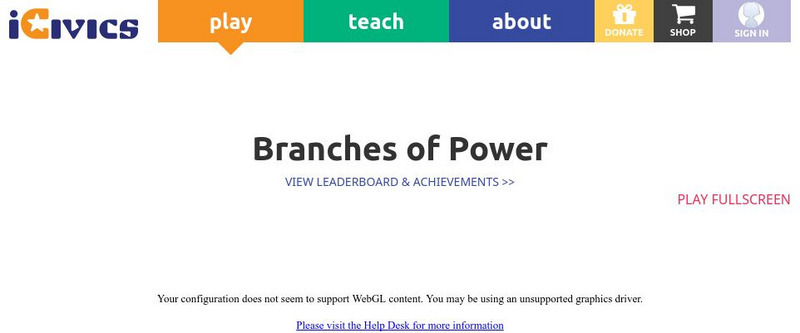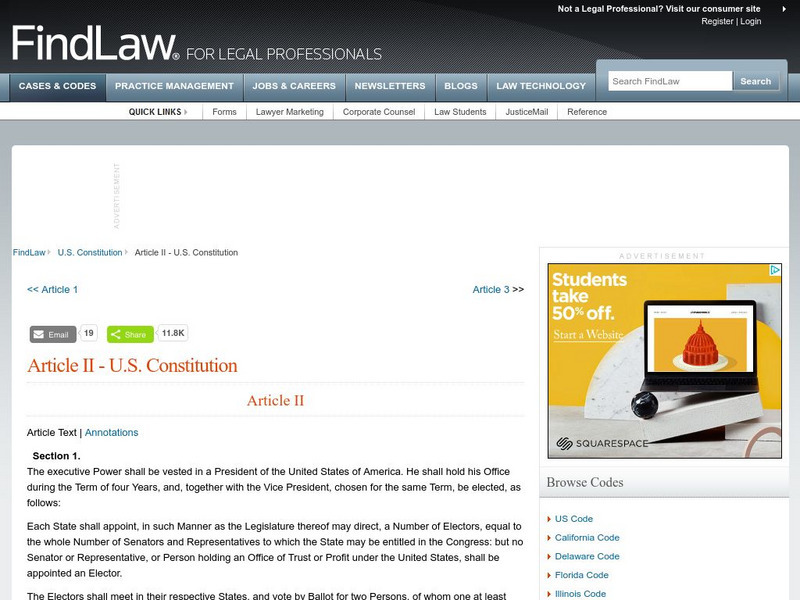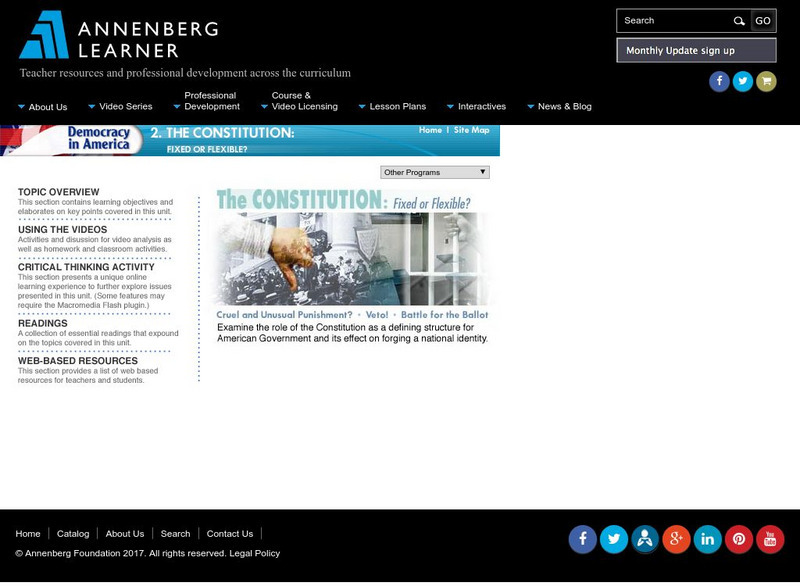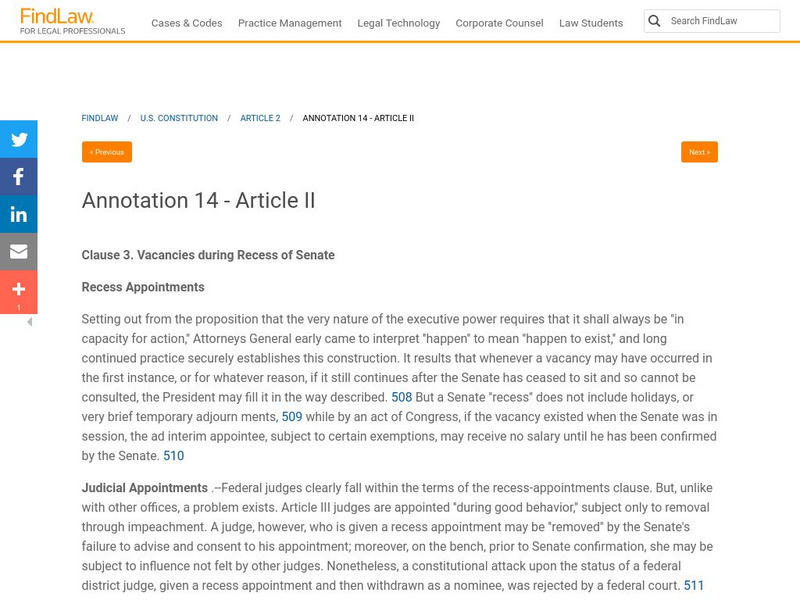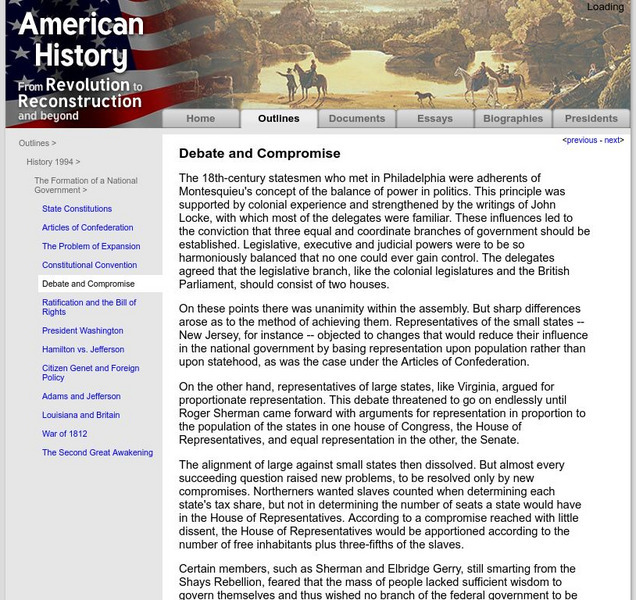Shmoop University
Shmoop: Executive Branch and Presidents
Basic information and key concepts about the Executive Branch and Presidents. Also available from the orange tabs on top: a few interesting stories on the history, a timeline that shows the development of the presidency, some quotes and...
Harry S. Truman Library and Museum
Harry S. Truman Library & Museum: Three Branches of Government
Interactive teaching unit for Grades 5-8 that helps to explain the three branches of government and the the balance of power. Topics covered include balance of government, how a bill becomes a law, the amendment process, the Legislative...
iCivics
I Civics: Games: Branches of Power
Interactive and educational game puts players in control of all three branches of government and tests their abilities to turn issues of concern into full-fledged laws.
iCivics
I Civics: Games: Executive Command
Have you ever thought about being president? Executive Command gives you four years in office to accomplish your legislative and policy goals. You'll make a state-of-the-union address, work with your aides and cabinet, try your hand at...
TED Talks
Ted: Ted Ed: How Do Executive Orders Work?
The framers of the American Constitution made the executive power available to the executive branch. But what exactly is this tool, how does it work, and what's the extent of its power? Christina Greer explains.
Thomson Reuters
Find Law: Article Ii: The Creation of the Presidency
A scholarly discussion of Article II of the U.S. Constitution, which establishes the executive branch of the U.S. government. Discusses the origin of the article and the debates on executive power that took place among the Founding...
iCivics
I Civics: For the President, All in a Day's Work
Students learn the primary responsibilities of the president and how those duties connect to the powers the Constitution grants to the Executive Branch.
Thomson Reuters
Find Law: Article Ii: Presidential Power to Use Troops
In-depth analysis of the use of presidential power to send troops abroad without consent of Congress.
Annenberg Foundation
Annenberg Learner: Democracy in America: The Modern Presidency: Tools of Power
This unit details how the role of the President of the United States has evolved to the position it is today since the ratification of the U.S. Constitution. Offers video, readings, web resources and activities.
US Mint
United States Mint: Branches of Power
Save the federal government from Oppressor Sam, and learn about the US Constitution to restore the three branches of government.
iCivics
I Civics: Branches of Power
Do you like running things? Branches of Power allows you to do something that no one else can: control all three branches of government! You'll have the power to write any laws you want about issues you choose. Careful, though, there's a...
Thomson Reuters
Find Law: u.s. Constitution: Article Ii: Powers and Duties of the President
This resource provides the annotation on Section 2, Clause 1 of the United States Constitution., which outlines the President's responsibilities as Commander-in-Chief.
US Government Publishing Office
Ben's Guide to u.s. Government: Judicial Branch (9 12)
Provides a brief overview of the judicial branch of the federal government. Discusses the origin of the judicial branch, the concept of judicial review, and functions of the judicial branch. Links to more information about the U.S....
Thomson Reuters
Find Law: Article Ii: The President as a Law Enforcer
Read Section 3 of Article II which explains what the President's duties are as Law Enforcer. The Constitution does not state that the President shall execute the laws himself, but that he will ensure that laws are "faithfully executed."
Thomson Reuters
Find Law: United States Constitution: Article Ii
Full text of Article II from the U.S. Constitution, as well as detailed annotations that explain the reasoning and subsequent impact of each clause and section of the Article. Content explores everything from the nature and scope of...
US National Archives
Nara: Teaching With Documents: The Treaty of Guadalupe Hidalgo (Activity)
The National Archives and Records Administration (NARA) provides a lesson, focusing on the treaty of Guadalupe Hidalgo, that relates to the power granted to the President and the Senate to make and approve treaties with foreign nations...
US Government Publishing Office
Ben's Guide to u.s. Government: Games
Test your knowledge of U.S. geography and government with these games and printable activities. In one game, see if you can place all 50 states in their correct location. In the second game, see if you can recognize the powers of each...
Other
The American Interest: China's Place in u.s. Foreign Policy
China's remarkable aggregation of national power over the past 35 years has been a source of wonderment: to economists, who have been surprised by that country's consistently high rate of growth; to political scientists, who are at a...
Annenberg Foundation
Annenberg Learner: Democracy in America: The Constitution: Fixed or Flexible?
This unit explores the timeless qualities of The U.S. Constitution, the opportunities to amend it, and how it is a pillar of the American identity, through these activities, videos, and outside resources.
Thomson Reuters
Find Law: Article Ii: Recess Appointments
Explains Clause 3 of Article II, Vacancies during Recess of Senate. It outlines various situations where a vacancy may occur and what rules are in place to deal with it.
University of Chicago
The Founders' Constitution: Federal v. Consolidated Government: Virginia Plan
The original text of The Virginia Plan presented at the Constitutional Convention. Discusses federal versus consolidated government.
PBS
Pbs Online News Hour: Rice on Iraq, War and Politics
Transcript of an interview of National Security Advisor Condoleezza Rice in September of 2002, discussing President George W. Bush's ideas about moving the US into war against Iraq.
Indiana University
Center on Congress: Learn About Congress
Learn about the role of the US Congress, how it works, its history, and the principles behind its creation and operation. Wonderful set of resources including FAQs, short articles and video clips, "interactive learning modules" (i.e., a...
University of Groningen
American History: Outlines: Debate and Compromise
The 18th-century statesmen who met in Philadelphia were adherents of Montesquieu's concept of the balance of power in politics. This principle was supported by colonial experience and strengthened by the writings of John Locke, with...



